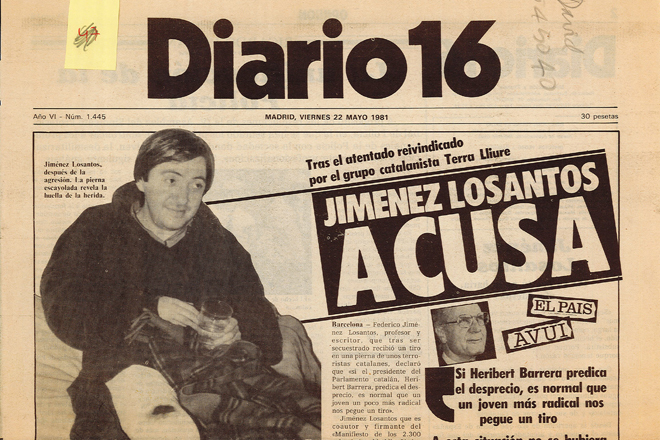Bertín Osborne receives this Friday the Turolense communicator in one of the most anticipated programs of his space 'My house is yours'.
The four corners of Federico, in LOC
Bertín Osborne receives this Friday, in one of the most anticipated editions of his program 'My house is yours' , the journalist Federico Jiménez Losantos, who last fall celebrated the 10th anniversary of esRadio as the reference station for liberalism in Spain .
Born in Orihuela del Tremedal (Teruel) in 1951, the son of a shoemaker and a teacher, he studied with two referents of Aragonese culture in the twentieth century: singer-songwriter José Antonio Labordeta and playwright José Sanchís Sinisterra . After enrolling at the University of Zaragoza, in 1971 he moved to Barcelona to finish his studies in Hispanic Philology.
In the Catalan capital he made contact with the effervescent political scene of the time. Jiménez Losantos took sides with Maoism and militated in some organizations. He also read abundantly communist bibliography, experience that would be the germ of his book 'Memory of Communism' (The Sphere of Books, 2018).
However, Solzhenitsin's reading and, above all, a trip to China in 1976 made him disabuse of that ideology . On the outskirts of Beijing, he found a girl sentenced to a re-education farm. "My muse of the lesson", I would remember four decades later, "a beauty that I only saw a few minutes, daughter of a brigadista. And when we said goodbye we looked at each other and I swore that I would be an anti-communist all my life." It was said: "There is no right for a girl whose only crime is to be someone's daughter to have to stay in this icy concentration camp and be shot tomorrow."
In 1978 his book 'Spanish culture and nationalism' appeared, which won the first Old Topo Essay Prize. A year later he gave the press 'What is left of Spain'. In both titles he posed a criticism of Catalanism that Jordi Pujol was beginning to lead.
Jiménez Losantos appeared as a candidate in the first regional elections to the Parliament of Catalonia, in March 1980 . He did it under the acronym of the Socialist Party of Andalusia, directed by Alejandro Rojas Marcos, the germ of the future Andalusian Party and which in Catalonia defended the rights of immigrant workers from southern Spain in Barcelona and its surroundings.
In parallel, the Turolense experienced a journalistic displacement. Thus, he went from collaborating with the newspaper 'El País' to doing so with 'Diario 16', which he directed since June 1980 Pedro J. Ramírez. The arrival of Jiménez Losantos at that head began a long relationship between both journalists.
In January 1981 Jiménez Losantos was one of the signatories of the 'Manifesto of the 2,300', which warned of the linguistic policy of Pujol, already as president of the Generalitat, and of the discrimination of Castilian with respect to Catalan. His anti-national militancy made him a target and on May 21, 1981 he was kidnapped by the terrorist band Terra Lliura, in one of his first actions. Pere Bascompte shot Jiménez Losantos in the leg , who they left tied to a tree. "It's normal that they shot me," he titled 'El País' after interviewing him. The attack caused him to leave Catalonia and settle in Madrid.
In the capital of Spain he became one of the main chroniclers of the 'Movida'. As the 1980s progressed, his movements by different journalistic companies expanded: he was a columnist for 'ABC' and broadcaster for Antena 3 radio, as well as a contributor to other media.
In 1992, after what he called the 'antenicide' (the liquidation of Antena 3 radio by PRISA), he went on to swell the payroll of the COPE network, in which he remained until 2009. With the turn of the century, he began his collaboration with EL MUNDO , a newspaper in which its columns are still published, and launched the 'Libertad Digital' website.
Linked to the latter, in 2009 he launched, after his controversial departure from COPE ("As José María García said, faith could not take it away from me, but the fans ...) the radio station is Radio. From there it has gone developing a polemicist style, which has even caused 'memes' of their expressions to be made ("Finito il tratto di favor al podemiti" has its own 'stickers' on whatsapp ) and by a glossary of nicknames that has become equally popular. In fact, the expression "podemita" bears his signature. This has caused, on numerous occasions, Jiménez Losantos has had to face his opponents for various complaints. One of the last, which was filed by the Catalan businessman Jaume Roures ( Mediapro) and that Losantos won.
According to the criteria of
Know more
Comments
This news has no comments yet
Be the first in give your opinion
0 comments
